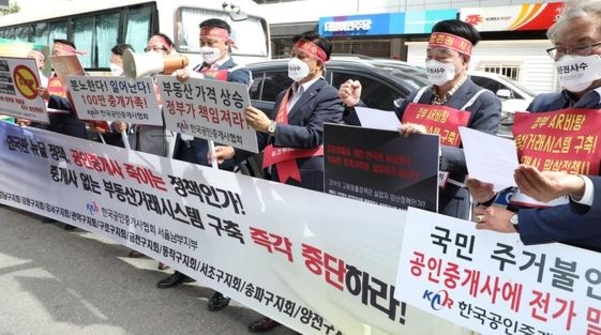Input 2021.02.16 06:00
But inside and outside the industry, there is also an objection that “introducing direct online transactions is not a reasonable solution.” This is because it is a problem directly related to the livelihoods of realtors with more than 110,000 people, and the cost and risk involved in the establishment and operation of the online direct transaction system are also high.

Under the current system, brokerage fees for real estate sales are based on the transaction amount ▲ less than 50 million won 0.6% (maximum 250,000 won) ▲ 50 million to less than 200 million won 0.5% (maximum 800,000 won) ▲ 200 million to less than 600 million won 0.4% ▲ 600 million ∼0.5% less than 900 million won ▲ 0.9% or more is applied. For lease agreements ▲0.5% less than 50 million won (maximum 200,000 won) ▲ 50 million to less than 100 million won 0.4% (maximum 300,000 won) ▲ less than 100 million to 300 million won 0.3% ▲ less than 300 million to 600 million won 0.4% ▲ more than 600 million won 0.8%, etc.
Among the recommendations of the Korea Rights Commission, the most promising proposal is for trading, incorporating less than 600 million won into 0.5%, 0.6% to 900 million won, and more than 900 million won divided into 5 steps, but the higher the amount, the smaller the rate. . In this case, when buying and selling an apartment of 1 billion won, the brokerage fee, which is currently up to 9 million won, is down 39% to 5.5 million won.
However, among market participants, even this is too much. It is said that as house prices have soared over the years, transaction costs including compounding expenses have increased. In January, the price of the mid-tier apartment in Seoul was 8759 million won and Gyeonggi was 46.1 million won. Yang Joon, a 39-year-old office worker, said, “I think it is excessive to show the house once and take millions of won.”
There are also voices saying that while the rate was divided into five steps in the recommendation, the welfare cost was rather increased. This is because until now, only the maximum rate has been suggested, so there have been many cases of consensus at the level of half the maximum rate. For example, in the case of buying and selling a house worth 800 million won, the upper limit of the coverage rate is 0.8%, but there were many cases where agreement was reached at the level of 0.4%.
As dissatisfaction with brokerage fees among market participants grows, there are voices asking whether real estate can also be directly traded. If you connect a registered copy reading system to an online platform and establish an electronic contract system that enables safe transactions through identification card authentication and warranty, it is possible to sell a house directly.
Mr. Jin, a 40-year-old office worker, said, “It does not require very new technology, but rather, it will have the advantage of preventing real estate fraud or fraudulent transactions.” Said.
However, the perspectives of domestic proptech companies and real estate market experts are somewhat different. Jikbang, which provides a service that allows you to check sales information on an online platform, said, “There is no plan to introduce a direct transaction system without intermediaries.”
“There is a need for legal judgment in the brokerage process, and there are concerns about the occurrence of a brokerage accident,” said a direct bang official. “There is currently no plan to substitute for the brokerage role or introduce a direct transaction system.” The company successively acquired various real estate-related startups such as’Hogang Nono’, which provides a service that allows you to view actual transaction prices and market prices,’Wooju’, the largest share house operator in Korea, and’Sugar Hill,’ which provides the largest commercial real estate platform, It is a representative startup related to real estate in Korea.
Another proptech industry practitioner said, “I think it is impossible for the government to institutionalize a system that allows direct real estate transactions without intermediaries by mobilizing public administrative powers such as town offices.” In terms of institutional supplementation, it is inefficient at the moment because more input costs may be incurred in order to increase stability.”
Real estate experts see it as a realistic alternative to improve the quality of intermediary services and strengthen institutional support for this, rather than disrupting existing industries such as real estate direct transactions. This means that it is better to recognize the role of the real estate agent and improve it in a situation where around 20,000 new realtors are pouring out a year and nearly 110,000 people are engaged in the brokerage business.
Typically, this means that the limit of deductions per person for a real estate agent should be increased or the indicators that must be checked and passed in the building sales process should be standardized in more detail. Now, even if an accident occurs during the brokerage process, the deduction limit is set at a maximum of 100 million won, so considering the housing transaction price, it is not high.
Professor Shim Gyo-eon of Konkuk University’s Department of Real Estate said, “The big voice for improving brokerage fees is that the public is feeling dissatisfied with the quality of brokerage services,” he said. “I think it is a more necessary alternative to realistically substantiate brokerage services.”
Another real estate expert said, “In real estate transactions, legal judgment is important, and it is also a problem that real estate agents have the right to live. By expanding the brokerage service behavior of brokers, it reduces the risk of disputes with traders and a sense of satisfaction with brokerage costs. You have to make it feel.”
